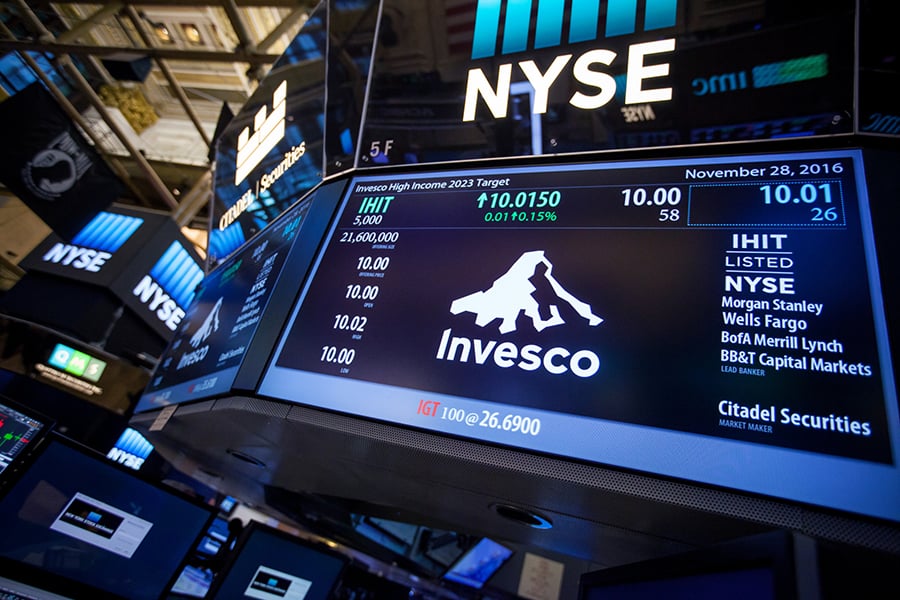

Invesco is ponying up approximately $105 million to make investors in an index fund whole following a botched quarterly rebalancing that caused the fund to lag the index by roughly 170 basis points during the last week of April.
The quarterly rebalancing, which normally takes place on the last Friday of the quarter, was delayed until April 24 due to the extreme stock market volatility at the end of March.
An Invesco spokesperson declined to comment for this story beyond what was included in an 8-K filing late Wednesday stating that the company “recently discovered and has corrected an error” related to the rebalancing.
The $5.6 billion Invesco Equally-Weighted S&P 500 Fund (VADDX) is designed to track the S&P 500 Equal Weight Index, but somehow fell out of sync on Monday, April 27 following the Friday, April 24 rebalance by more than 30 basis points.
The fund’s tracking error on Tuesday, April 28, jumped to nearly 60 basis points, and after the market closed on Wednesday, April 29, the fund had lagged the index by another 83 basis points.
Invesco’s injection of capital into the fund Wednesday, which coincided with the 8-K filing, sent the fund’s May 6 performance to 179 basis points above that of the index, but brings the fund back on track.
According to the regulatory filing, Invesco, which manages more than $1.2 trillion, acknowledged that the tracking error resulted from a misinterpretation of the altered rebalancing schedule as communicated by S&P Dow Jones Indices.
“In March 2020, due to volatility in the equity markets, S&P Dow Jones Indices communicated the decision to delay, and ultimately to separate, the rebalancing dates for its indices and noted some indices would be rebalanced in April and others in June. The company noted this delay but not the separation of rebalance dates and omitted rebalancing the funds on April 24, 2020 when S&P rebalanced the Index,” according to the filing.
“The company discovered this omission and rebalanced the funds on April 29, 2020. The Company will make a contribution to the Funds of approximately $105 million to compensate them for the performance difference that arose from market movements between April 24 and April 29.
“This fund matter is not expected to have a material impact on the firm’s financial strength or financial condition. The company maintains a strong balance sheet and adequate cash resources,” according to the filing.
Rebalancing postponements are extremely rare, but they do happen. The S&P 500 market-capitalization index was suspended for the entire quarter — which has only happened one other time — right after the Sept. 11 terrorist attacks that shut down the financial markets for almost a week.
While it is not yet clear what caused the rebalancing snafu with Invesco’s equal-weight index mutual fund, it is clear Invesco’s exchange-traded fund tracking the same index, $10.6 billion RSP, did not suffer the same tracking error.
Nor did the $42 million Index Funds S&P 500 Equal Weight mutual fund (INDEX) have any difficulty adjusting to the rebalancing schedule change.
“Looks like Invesco did the right thing by stepping up and making the fund true again,” said Michael Willis, lead portfolio manager of INDEX.
“They just erased the tracking error and made it go away,” Willis said. “This is kind of an example of how when the big boys make mistakes, they can fix them, but it’s good to see the right thing was done for investors.”

Relationships are key to our business but advisors are often slow to engage in specific activities designed to foster them.

Whichever path you go down, act now while you're still in control.

Pro-bitcoin professionals, however, say the cryptocurrency has ushered in change.

“LPL has evolved significantly over the last decade and still wants to scale up,” says one industry executive.

Survey findings from the Nationwide Retirement Institute offers pearls of planning wisdom from 60- to 65-year-olds, as well as insights into concerns.
Streamline your outreach with Aidentified's AI-driven solutions
This season’s market volatility: Positioning for rate relief, income growth and the AI rebound
